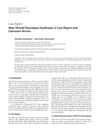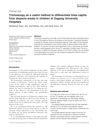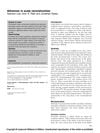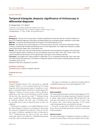 30 citations,
July 2004 in “Fertility and Sterility”
30 citations,
July 2004 in “Fertility and Sterility” Amenorrhea is when a woman doesn't have periods, with primary amenorrhea starting by age 15 or within five years of breast development, and secondary amenorrhea when periods stop for three months. It affects 3-4% of women not pregnant, breastfeeding, or in menopause, mainly due to polycystic ovary syndrome, hypothalamic amenorrhea, hyperprolactinemia, and ovarian failure.
 29 citations,
February 2017 in “International Journal of Women's Dermatology”
29 citations,
February 2017 in “International Journal of Women's Dermatology” Women with excessive male-pattern hair growth should get a full hormone check-up to find and treat any underlying issues, considering both medical and emotional aspects.
 29 citations,
January 2011 in “Journal of Obstetrics and Gynaecology”
29 citations,
January 2011 in “Journal of Obstetrics and Gynaecology” Insulin resistance in women with PCOS can lead to serious health issues, but lifestyle changes and certain medications can help manage symptoms.
 28 citations,
February 2019 in “Genes”
28 citations,
February 2019 in “Genes” Proper control of β-catenin activity is crucial for development and preventing diseases like cancer.
 28 citations,
October 2018 in “Clinical Obstetrics and Gynecology”
28 citations,
October 2018 in “Clinical Obstetrics and Gynecology” Testosterone therapy seems safe and effective for transgender men with proper care, but more long-term research is needed.
 28 citations,
January 2015 in “Journal der Deutschen Dermatologischen Gesellschaft”
28 citations,
January 2015 in “Journal der Deutschen Dermatologischen Gesellschaft” Women with scarring alopecia have a lower quality of life and more anxiety and depression than those with non-scarring alopecia.
 28 citations,
January 2012 in “Case Reports in Medicine”
28 citations,
January 2012 in “Case Reports in Medicine” Hair-thread Tourniquet Syndrome, where hair or thread tightly wraps around a body part, is not rare and requires early detection to prevent serious damage.
 28 citations,
November 2007 in “Medical Clinics of North America”
28 citations,
November 2007 in “Medical Clinics of North America” Obesity worsens Polycystic Ovary Syndrome symptoms, and weight loss is a key treatment.
 28 citations,
May 1986 in “Clinics in endocrinology and metabolism”
28 citations,
May 1986 in “Clinics in endocrinology and metabolism” New compounds may soon be tested to treat excessive hair growth in women.
 27 citations,
November 1998 in “Journal of Endocrinological Investigation”
27 citations,
November 1998 in “Journal of Endocrinological Investigation” Finasteride significantly reduces hair growth in women with idiopathic hirsutism.
 27 citations,
April 1996 in “Baillière's clinical endocrinology and metabolism”
27 citations,
April 1996 in “Baillière's clinical endocrinology and metabolism” The document says that understanding the causes of PCOS is important for treatment, especially in distinguishing the syndrome from just having cystic ovaries, and that losing weight is key for obese women with PCOS.
 26 citations,
September 2016 in “International Journal of Dermatology”
26 citations,
September 2016 in “International Journal of Dermatology” Trichoscopy is good for telling apart tinea capitis and alopecia areata in kids.
 26 citations,
July 2006 in “Current Opinion in Otolaryngology & Head and Neck Surgery”
26 citations,
July 2006 in “Current Opinion in Otolaryngology & Head and Neck Surgery” New techniques in scalp reconstruction have improved cosmetic results and reduced complications, especially for large defects.
 26 citations,
January 1994 in “Hormone and Metabolic Research”
26 citations,
January 1994 in “Hormone and Metabolic Research” Taking spironolactone and linestrenol for androgen excess can lead to lower bone density in young women.
 25 citations,
June 2012 in “Endocrine”
25 citations,
June 2012 in “Endocrine” PCOS may start before birth, involves metabolic issues, and can be treated with drugs like metformin and lifestyle changes.
 25 citations,
March 2009 in “Dermatologic Surgery”
25 citations,
March 2009 in “Dermatologic Surgery” Eyebrow transplantation can be successful for Asians with the right technique and care, but regular maintenance is necessary.
 24 citations,
September 2014 in “Journal of the European Academy of Dermatology and Venereology”
24 citations,
September 2014 in “Journal of the European Academy of Dermatology and Venereology” Trichoscopy is reliable for diagnosing Temporal Triangular Alopecia and can prevent unnecessary biopsies and wrong treatments.
 24 citations,
November 2007 in “Journal of Investigative Dermatology Symposium Proceedings”
24 citations,
November 2007 in “Journal of Investigative Dermatology Symposium Proceedings” Hair and scalp disorders significantly affect self-esteem, and using cosmetic products like conditioners and styling aids can improve hair health and appearance.
 23 citations,
December 2017 in “Scientific Reports”
23 citations,
December 2017 in “Scientific Reports” ARL15 is important for fat cell development and the release of the hormone adiponectin.
 23 citations,
February 2014 in “Journal of Pediatric and Adolescent Gynecology”
23 citations,
February 2014 in “Journal of Pediatric and Adolescent Gynecology” Low-dose finasteride reduces excessive hair growth in teenage girls safely and affordably.
 23 citations,
December 2004 in “Differentiation”
23 citations,
December 2004 in “Differentiation” Sex hormones affect hair and feather growth and may help manage alopecia and hormone-dependent cancers.
 23 citations,
February 2004 in “Clinical and Experimental Ophthalmology”
23 citations,
February 2004 in “Clinical and Experimental Ophthalmology” A boy with chromosome 13q deletion syndrome developed eye cancer, a woman with breast cancer lost vision due to a rare side-effect of her treatment, a man's vision worsened after using a hair loss drug, and two rare disorders were discussed. Optical Coherence Tomography is useful for diagnosing and monitoring these conditions.
 22 citations,
April 2011 in “Anais Brasileiros de Dermatologia”
22 citations,
April 2011 in “Anais Brasileiros de Dermatologia” Hair transplants can lead to hair loss from lichen planopilaris, and patients should be tested and wait two years before the procedure.
 22 citations,
March 2000 in “Clinical endocrinology”
22 citations,
March 2000 in “Clinical endocrinology” Most patients experienced hirsutism again after stopping hormone treatment, indicating long-term treatment is needed to maintain results.
 22 citations,
June 1993 in “Calcified Tissue International”
22 citations,
June 1993 in “Calcified Tissue International” Women with hyperandrogenic amenorrhea have similar bone density to healthy women but lower than androgenized women without amenorrhea, and high DHEAS levels might affect bone density.
 21 citations,
June 2016 in “Genesis”
21 citations,
June 2016 in “Genesis” Researchers identified specific genes that are important for mouse skin cell development and healing.
 21 citations,
September 2004 in “Fertility and Sterility”
21 citations,
September 2004 in “Fertility and Sterility” Amenorrhea, or the absence of periods, should be evaluated by age 15 or within five years of early breast development, and is most commonly caused by conditions like polycystic ovary syndrome and hypothalamic amenorrhea.
 21 citations,
August 1994 in “Clinical endocrinology”
21 citations,
August 1994 in “Clinical endocrinology” 5α-Reductase inhibitors can help treat hair loss, acne, and prostate issues by reducing DHT levels.
 20 citations,
July 2013 in “European Journal of Oral Sciences”
20 citations,
July 2013 in “European Journal of Oral Sciences” A new PAX9 gene mutation causes missing teeth and hair problems, but not skin or nail issues.
 20 citations,
May 2013 in “International Journal of Molecular Medicine”
20 citations,
May 2013 in “International Journal of Molecular Medicine” Researchers found a new gene variant linked to a rare bone disease, which doesn't always cause symptoms in carriers.





























